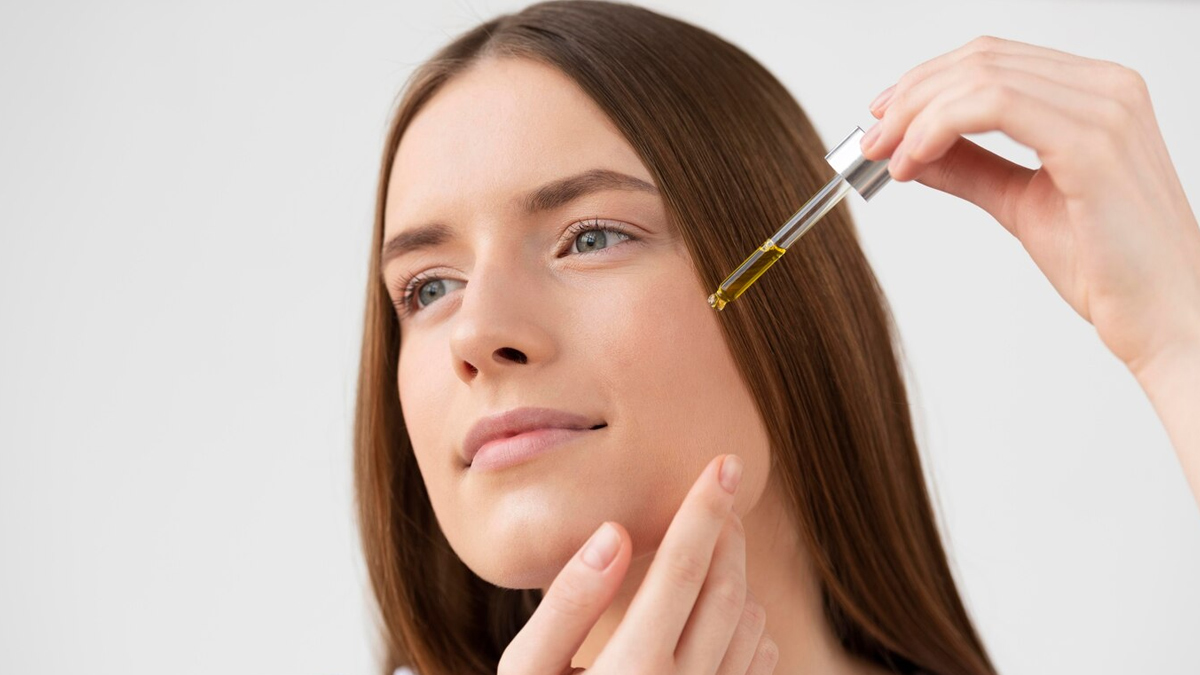
Facial oils have gained immense popularity in skincare routines, especially for their ability to nourish and protect the skin. Dabangg actress Sonakshi Sinha had recently revealed in an interview with a media outlet that she uses facial oils to nourish and manage her dry skin. "I moisturise and use a blend of aloe vera gel with jojoba and almond oil. It forms a soothing paste that I apply to my face," she had shared.
Table of Content:-
While some people swear by the hydrating and skin-repairing properties of facial oils, others worry about the side effects that come with it. So, are facial oils truly beneficial for all skin types?
In an exclusive conversation with OnlyMyHealth, Dr Tanushree Biswas, Dermatologist and Medical Advisor, Kaya Limited, explains how facial oils can help manage dry skin, their role in acne-prone skin, and the best ways to incorporate them into a skincare routine.
Also Read: 5 Face Oils To Get Rid Of Face Wrinkles
Can Facial Oils Help Manage Dry Skin?

According to Dr Biswa, facial oils do not directly hydrate the skin like humectants but play a crucial role in sealing in moisture.
"They form a protective barrier that prevents transepidermal water loss, keeping the skin soft and supple," she explains. Additionally, facial oils are rich in essential fatty acids, antioxidants, and vitamins that help repair the skin barrier, improve elasticity, and provide long-lasting nourishment.
For individuals with dry or dehydrated skin, using facial oils can enhance skin texture, soothe irritation, and prevent flakiness. Some of the best oils for hydration include squalane, jojoba oil, rosehip oil, marula oil, and argan oil, as they provide deep nourishment without leaving a greasy residue.
What About Acne-Prone Skin Types? Are Facial Oils Recommended?

Acne-prone skin requires extra caution when using facial oils, as some can clog pores and trigger breakouts. "Oils with high comedogenic ratings, such as coconut oil, can contribute to congestion and exacerbate acne," says Dr Biswa. However, non-comedogenic options like squalane, rosehip, and jojoba oil can actually help regulate sebum production and support acne-prone skin.
The key is to choose lightweight, fast-absorbing oils that do not sit heavily on the skin. Dr Biswa advises starting with a patch test before full application and using facial oils in moderation. Overuse can lead to excessive oil buildup, potentially trapping bacteria and worsening breakouts.
Also Read: Use Facial Oil At Night for Many Skin Benefits, Read How To Use Them
How To Incorporate Facial Oils To Skincare Routine?
Dr Biswa recommends applying facial oils strategically to maximise their benefits. "For dry skin, facial oils work best as the final step in the nighttime routine to lock in hydration," she notes. In the morning, they can be applied before sunscreen to provide a nourishing boost.
For extra hydration, a few drops of facial oil can be mixed into a moisturiser. Those with combination or oily skin should use them sparingly—just a drop or two is sufficient. Sensitive skin types should opt for fragrance-free oils and apply them after moisturiser to help calm irritation. Additionally, facial oils can be used under makeup to create a radiant, dewy finish.
Who Should Avoid Using Facial Oils?

While facial oils offer numerous benefits, not all skin types react positively to them. "Acne-prone individuals should avoid heavy oils that may clog pores and instead opt for non-comedogenic, fast-absorbing alternatives," advises Dr Biswa. Similarly, people with extremely oily skin may find facial oils too occlusive and should use them only as needed.
For those with sensitive or reactive skin, essential oils and heavily fragranced formulations should be avoided, as they can cause irritation. Selecting the right oil based on individual skin concerns is crucial for ensuring facial oils provide hydration and nourishment without unwanted side effects.
Conclusion
Facial oils can be a game-changer in skincare when used correctly. They help lock in moisture, strengthen the skin barrier, and provide essential nutrients. However, selecting the right type of oil for your skin type and applying it in moderation is key to avoiding potential side effects. As Dr Biswa emphasises, "Understanding your skin’s needs and choosing appropriate ingredients will help you make the most of facial oils without compromising skin health." Whether your skin is dry, acne-prone, or sensitive, using facial oils mindfully can enhance your skincare routine and contribute to a healthy, glowing.
Also watch this video
How we keep this article up to date:
We work with experts and keep a close eye on the latest in health and wellness. Whenever there is a new research or helpful information, we update our articles with accurate and useful advice.
Current Version